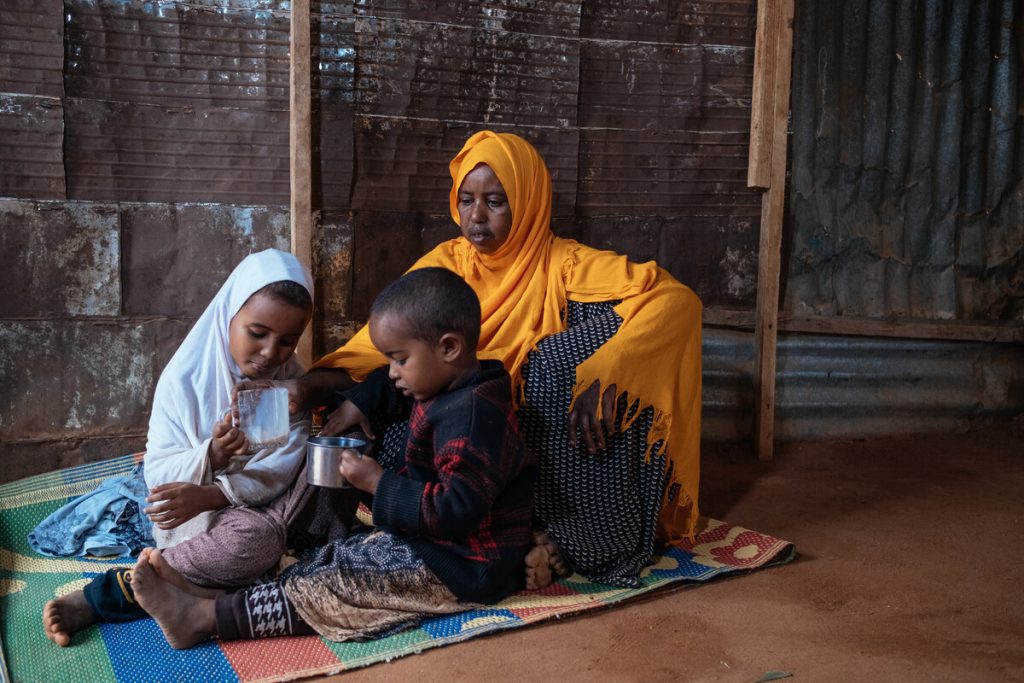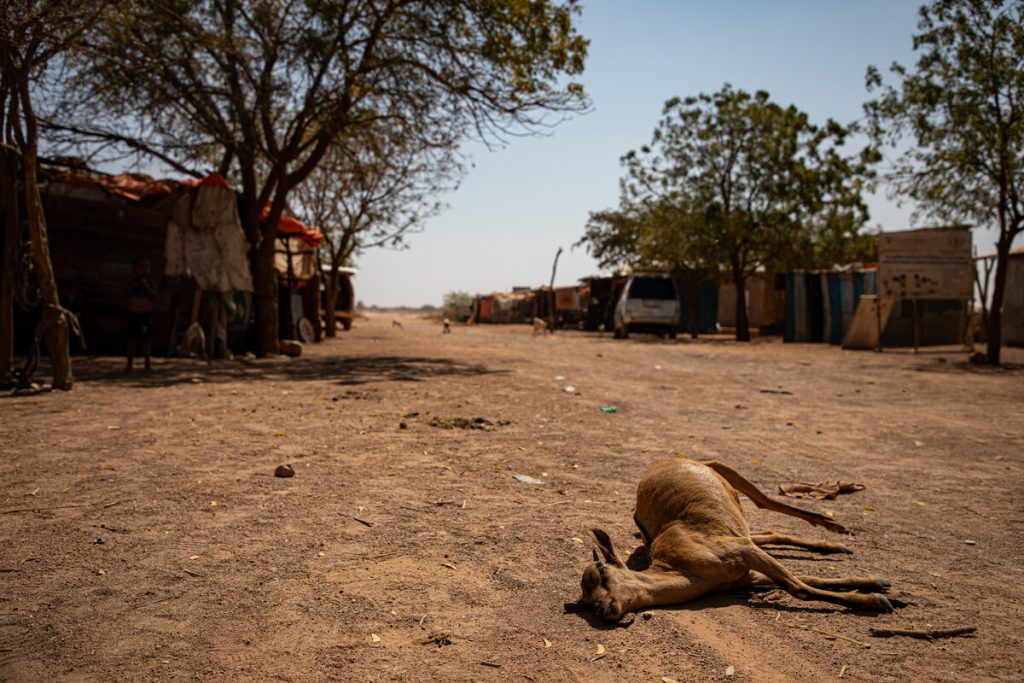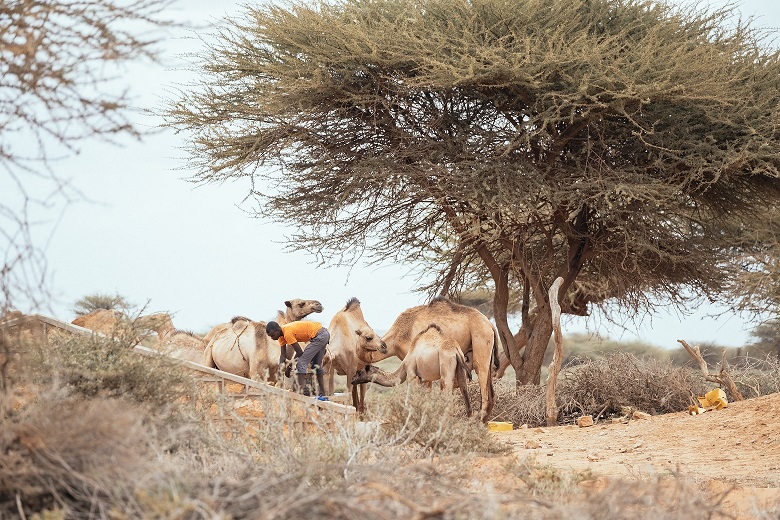While there are a variety of concerns about the quality of life in Somaliland, our staff who have been supporting communities very closely have all raised the alarm on two main issues: restricted access to food and water and the health and safety of women. These issues have been exacerbated by external factors that act as an additional burden on communities while the drought has created almost inhabitable conditions, making it impossible for people to sustain themselves or rely on their neighbors. Minimal government intervention has also prolonged Somaliland’s recovery from the drought and has pushed the crisis into a downward spiral. Hibo and Mohamed, who are both part of the ActionAid team in Somaliland, have voiced these concerns and are currently helping to improve the conditions in local communities by strengthening resilience and removing barriers to access resources.
Hibo is a lawyer who works as a Women’s Rights Officer and Protection Specialist. One of her main responsibilities is to implement women’s rights programs in three areas: protection, economic empowerment, and advocacy. She says that the drought started right as Somaliland began experiencing the effects of COVID-19, and dealing with both together added increasing pressure on resources.
This drought has been the worst to hit Somaliland because other droughts that occurred in the previous years only affected one side of the country, and communities were able to move to other unaffected areas. But this drought has spread across the entire country, giving displaced communities no place to find comfort or reliable community sources to lean on for support. Due to this, communities have lost the majority of their livestock. Hibo shares:
“We are losing a lot of livestock and a lot of people [are dying], especially vulnerable people – breastfeeding women, pregnant women, children, disabled people [and elderly] people.”

Hibo also talks about how the drought has threatened the lives of women and girls through gender-based violence (GBV.) She points out that, with the worsening of the drought, marriages have become a bargaining system. A wealthier man will offer three months of water supply to a family in exchange for their daughter. As the impact of the drought magnifies, so does the urge to marry off daughters for self-benefit. We can only see such practices multiply if the impacts of the drought are not addressed. Hibo shares that:
“When [there is a] drought or another crisis, women and children, and [particularly] girls are very vulnerable. The violations against them become very high – including rape and domestic violence and people that can take [advantage of their vulnerability].”
The war on Ukraine has also had a major impact on the lives of Somalilanders as well. The drought and inflation have occurred simultaneously, causing fuel and food prices to skyrocket. Hibo says that families are now selling one goat for $60-$70. Previously, this amount could sustain a family for an entire month, but now it can only buy up to two food items. Cooking gas prices have also increased from $16-$17 to $25. She adds that this is the first time that Somaliland has felt the effects of a war happening between countries that are, geographically, nowhere close to it.
If such conditions persist, a famine is soon to come
Mohamed is a meal coordinator at ActionAid Somaliland. He shared with us that this drought is so severe because of the lingering effects of COVID-19 and the war on Ukraine. The most affected communities have been those who are already disadvantaged by not having a stable source of income.
Mohamed mentions people do not have livestock that they can milk and sell in the market. This is a huge loss for Somaliland’s predominantly pastoralist communities that generate most of their livelihood from livestock. Somaliland has also received significantly less rainfall than usual, which directly affects the health of livestock as there is no water or pasture. If such conditions persist, a famine is soon to come. Mohammed mentions that:
“According to [a] report that [was] released this June, [there is a] projection that there will be a famine across Somalia, and most probably the most challenging situation and locations will be in Somaliland because they are already in IBC Phase 5 [the fifth phase] of food insecurity classification. What’s beyond IBC 5 is famine.”

Mohamed also talks about the shortcomings of Somaliland’s underdeveloped health infrastructure and how those are especially exacerbated in times of crisis. Health facilities are unable to provide for women and those who are dealing with severe health conditions. Rural areas, especially, often have no available medicines, drugs, or health professionals, leaving people in those areas extremely under-supported.
Women are the nucleus of the communities. They are mothers who look after the health of the entire family. In pastoral areas, they are responsible for rearing, milking, slaughtering, and taking care of the livestock, particularly goats and sheep in Somaliland. So, if women are unable to access resources, it is not only them but the entire community that will suffer. Mohamed shares that:
“[In] Somali culture, women [are] the backbone of society, whether they are living in rural or urban areas. When the crisis happens, women living in urban areas unite themselves and organize themselves, so that they can collect money to respond to their families [who are] left in the countryside. They send [food to] their relatives and families to [alleviate] their immediate worries.”
So what can you do?
The food crisis in Somaliland proves how access to basic resources can strengthen resilience in entire communities, and how their deprivation can slowly endanger them. This is why the situation there demands our attention now more than ever.
The drought has clearly, and very drastically, changed the lives of communities across Somaliland. As the crisis continues to evolve, we remain committed to supporting communities impacted by these converging crises in both the short- and long-term. We take pride in our women-centered and women-led approach because we believe that women have a strong understanding of their local contexts. We aim to promote feminist leadership as we support affected women in Somaliland to transform their livelihoods and those of their children and their communities.


